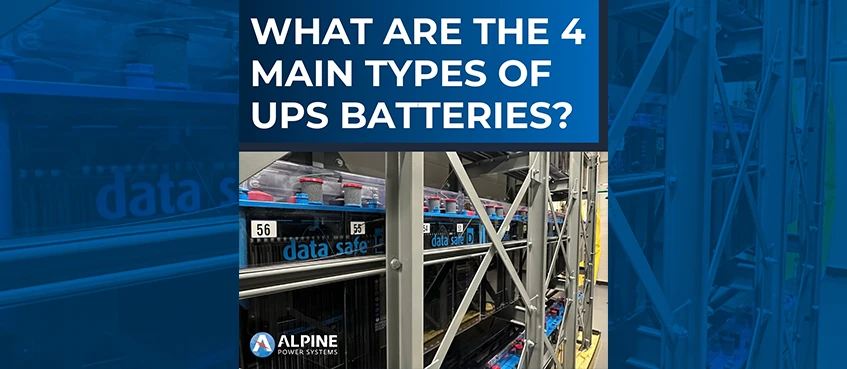August 6, 2024 | Rob Hirschberg
What Are The 4 Main Types Of UPS Batteries?
News Alerts & Updates
Join our email newsletter for industry trends, best practices, company news, & more.
When it comes to safeguarding your critical systems, selecting the right Uninterruptible Power Supply (UPS) battery is crucial. With several options available, understanding the differences between each type can help you make an informed decision that meets your specific needs. In this blog post, we'll explore the four main types of UPS batteries—VRLA, VLA, NiCad, and Lithium—each offering unique benefits and features that cater to various applications and environments.

Share
VRLA Batteries:
Sealed batteries, also known as VRLA UPS batteries, are designed with polypropylene plastic sealing to prevent acid leaks. These batteries include a valve that releases excess gas pressure, making them a low-maintenance option. Typically, VRLA batteries offer a service life of around five years, making them a cost-effective solution for many standard UPS applications.
VLA Batteries:
Also known as flooded batteries, VLA batteries are known for their high reliability and generally longer lifespan compared to VRLA variants. However, they do require separate housing due to safety considerations, making them more suitable for specific environments. Despite the additional housing requirements, VLA batteries remain a strong and dependable choice for those looking for longevity in their power supply.
NiCad Batteries:
NiCad batteries are ideal for UPS applications in environments with exceptionally high ambient temperatures. These batteries are engineered to withstand deep discharges and feature a 20-year design life, making them one of the most durable options available. Their resilience in extreme conditions makes them a popular choice for industries that demand high reliability.
Lithium Batteries:
Lithium batteries excel in high-temperature environments, requiring less cooling and lower maintenance compared to other battery types. While they have a higher initial cost, their longer service life—often double that of VRLA batteries—results in lower total ownership costs. This makes lithium batteries an attractive option for businesses looking for long-term efficiency and reliability in their UPS systems.
Selecting the right UPS battery type depends on various factors, including the specific environmental conditions, maintenance capabilities, and long-term cost considerations. VRLA, VLA, NiCad, and Lithium batteries each offer distinct advantages that cater to different needs, ensuring that your critical systems remain protected and operational. By understanding the features and benefits of each battery type, you can choose the most suitable solution for your power supply requirements, ultimately safeguarding your operations against unexpected interruptions.
Explore More Critical Power Articles



